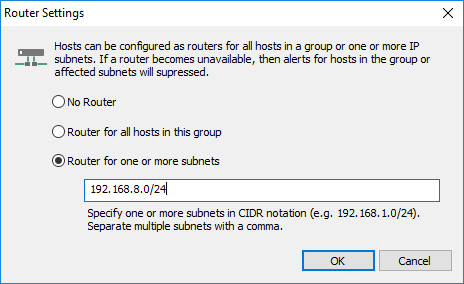When monitoring routers in addition to other network devices, such as servers that are located behind that router, unnecessary heartbeat alerts can be avoided by assigning the "router" flag to a monitored computer.
Routers can be defined in two ways:
•Router for all hosts in a group
•Router for one or more specific subnets
A host can be configured as a router by right-clicking the host in the left tree pane, or by selecting the host and choosing "Set as Router" from the ribbon.
When a host is designated as a router in a group, then alerts written to the event log will be suppressed for all hosts for which the router is responsible for, with the exception of the host which is designated as a router. Information that is written to the database is not affected by this setting, and the heartbeat status and history page will still show the actual network status.

Router for all hosts in a group
When selected, makes the host the dedicated router for all hosts in the same EventSentry group.
Router for one or more subnets
When selected, makes the host the dedicated router for all hosts in the specified subnet(s). For example, if the specified subnet is 192.168.8.0/24 and the dedicated router becomes offline, then event log alerts will be suppressed for all hosts in the IP range from 192.168.8.1 to 192.168.8.254 (while the router is offline). Specify the network mask in CIDR notation.
The table below shows which type of alerts will be generated when a router becomes unavailable:
Computer |
Router |
Network Status |
Event Log |
Heartbeat Status |
Heartbeat History |
ROUTER |
Yes |
Host Down |
Yes |
Yes |
Yes |
HOST1 |
No |
Unknown |
No |
Yes |
Yes |
HOST2 |
No |
Unknown |
No |
Yes |
Yes |